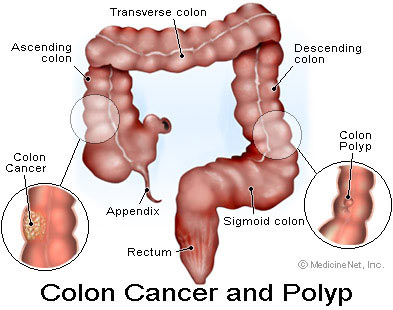Detection of genetic risk of bowel cancer
According to a study, published in the journal Public Library of Science Genetics, the scientists discovered a single variant in the human genome that could lead to colon cancer. .
This finding could open the door to the production of new drugs that treat the disease.
Previous studies have identified 14 DNA variants that increase the risk of bowel cancer by about 1.5-2 times higher. These variants are called individual nucleotide morphologies (SNPs).

Illustration of bowel cancer
An international team of scientists, led by British researchers at the ICR Institute, are eager to discover that these variants are not only linked to bowel cancer but also the cause of the disease. .
In the experiment, Dr. Richard Houlston renovated ICR and colleagues screened 2,000 people with bowel cancer and a comparison group of 2,000 healthy people without the disease.
The results showed that if anyone had a change in the genetic code at the gene variant called rs16888589, they would produce more protein from a gene called EIFH3 . Scientists also found that having high levels of EIFH3 protein leads to the development of bowel cancer .
According to statistics, bowel cancer is the second most common disease, only after lung cancer, but the rate of successful treatment is up to 90% if detected early.
Bowel cancer is a term used to refer to colon and rectal cancer. These are the last two " gateways " of food digestion, so any errors in the digestive system are likely to cause abnormalities in cell development in these places. When the digestive tract is in trouble, most tumors are more likely to develop in the colon and rectum than other organs.
Like other cancers, fatigue and unexplained weight loss are two common symptoms. However, bowel cancer is more likely to occur when your body has the following typical symptoms: bleeding when going out; diarrhea or constipation lasting more than 2 weeks; often feel full or bloated in the lower abdomen; occasional throbbing or uncomfortable pain in the abdomen; or ultrasound to detect tumors in the abdomen.

- HDL cholesterol reduces the risk of bowel cancer
- Detected two culprit genes causing bowel cancer
- Aspirin increases the risk of bowel cancer
- Aspirin helps prevent bowel cancer
- There has been a new breakthrough in bowel cancer treatment
- More than 30g of alcohol per day, the risk of bowel cancer increases 25%
- New use of Aspirin: Reduces the risk of bowel cancer
- Less eating red meat avoids cancer
- The incidence of bowel cancer increases in China, the US, Australia and Europe
- Early detection of cancer by genetic testing
- Reduce the risk of cancer by 50% if you eat apples every day
- Metformin reduces the risk of cancer in diabetics
 Green tea cleans teeth better than mouthwash?
Green tea cleans teeth better than mouthwash? Death kiss: This is why you should not let anyone kiss your baby's lips
Death kiss: This is why you should not let anyone kiss your baby's lips What is salmonellosis?
What is salmonellosis? Caution should be exercised when using aloe vera through eating and drinking
Caution should be exercised when using aloe vera through eating and drinking Good news: New cancer drug discovered that causes cancer cells to 'starve'
Good news: New cancer drug discovered that causes cancer cells to 'starve'  Experiment shows Covid virus can shrink tumors of 4 types of late-stage cancer
Experiment shows Covid virus can shrink tumors of 4 types of late-stage cancer  Anti-cancer substance discovered in a familiar mushroom
Anti-cancer substance discovered in a familiar mushroom  Food poisoning bacteria may help fight cancer
Food poisoning bacteria may help fight cancer  New discovery about cancer detection ability of bees and dogs
New discovery about cancer detection ability of bees and dogs  Top 7 Viruses That Can Lead to Cancer You Should Know
Top 7 Viruses That Can Lead to Cancer You Should Know 